
Welcome to Watcher Forum
|
| | | SPRING'S 5 AUG = The Missing 13th Amendment, |  |
| | | Author | Message |
|---|
Guest
Guest
 | |   | | Guest
Guest
 |  Subject: The Missing 13th Amendment Subject: The Missing 13th Amendment  Sun Aug 05, 2018 3:25 pm Sun Aug 05, 2018 3:25 pm | |
| #1https://www.dailykos.com/stories/2007/7/10/356123/- The Missing 13th AmendmentPosted on January 7, 2015 | 25 CommentsTHE ORIGINAL CONSTITUTION BARRED THE BAR’S ‘ESQUIRES’ FROM HOLDING PUBLIC OFFICE!
From the ACS Editor: Judge Dale also explains how the momentous Supreme Court decision, Bond v. US (2000), was intentionally buried to prevent the people from finding out about the faux USA corporate government that has been unlawfully ‘slid’ into place.
By Judge Dale, retired
04-16-13
 On or about March 20, 2013, the New Hampshire Legislature passed HB 638, recognizing Article XIII, known by few as: “The Missing 13TH Amendment,” missing from the organic Constitution of the United States of America and the legislative analysis that was offered, described a trite but secret history of this mystical amendment, which I have encapsulated as follows: On or about March 20, 2013, the New Hampshire Legislature passed HB 638, recognizing Article XIII, known by few as: “The Missing 13TH Amendment,” missing from the organic Constitution of the United States of America and the legislative analysis that was offered, described a trite but secret history of this mystical amendment, which I have encapsulated as follows:
RE: During the American Civil War, the country was under Martial Law by President Lincoln and after the War, Lincoln’s policies were to be abated and everything was supposed to return to normal but it didn’t happen quite that way. Congress passed the Organic Act of 1871, which created a government corporation within the District of Columbia, called: UNITED STATES OF AMERICA. This new government corporation replaced the Municipal Charter for the District of Columbia, a move that egregiously led to the fraudulent rewrite and adoption of what appeared to be the organic American Constitution. This erroneous rewrite is described as a corporate “mission statement” with the original 13TH Amendment “omitted” and it was this Constitutional rewrite that was inadvertently published for all to see.
Members of royalty, PhD’s, lawyers, squires and bankers, “Titles of Nobility,” have left an historic wake of deceit, destruction and corruption behind them on this planet and I would like to believe that it was the majority intent of the Founding Fathers and the first federal convention, to shield America from those proven elements of destruction and corruption. In so doing they proposed and ratified several amendments, one being Article XIII or the 13th Amendment, specifically designed to bar candidates who held such “Titles of Nobility,” from ever holding a seat in government! Each year since 1871, Lincoln’s Martial Law has been renewed by Congress and currently, all state and federal governments are dominated by legislators with, “Titles of Nobility.” What was once regarded as a service to country is now a political career.
Quote: “In politics, nothing happens by accident. If it happens at all, you can bet it was planned that way.” Franklin D. Roosevelt
The described “omission” of Article XIII [the missing 13th Amendment] and the “mission statement” the fraudulent copy of the organic constitution initiates the following [ten] questions, which I will attempt to answer as succinctly as I can.
QUESTION 1: How do you “omit” a Constitutional Article when they are all sequentially numbered?
ANSWER 1: Obviously this is a lawyer’s response by the New Hampshire Legislature because you cannot simply “omit” a Constitutional Amendment, they are sequentially numbered! The original Article XIII was intentionally and methodically removed from existence, which took a number of years to complete and was NOT simply “omitted.” It required a conspiracy; a federal rewrite; the removal of all former texts and references to the original Article XIII and the domination of all the various state government legislatures by candidates holding, “Titles of Nobility,” who would be willing to save their careers at any cost, thus proving that this was all intentional on their part to complete and sustain its demise.
QUESTION 2: Why didn’t Lincoln’s Martial Law policies abate and the government return back to normal following the Civil War?
ANSWER 2: The federal government for the American Republic had IMPLODED when the southern states decided to secede from the Union and walk out while Congress was still in session. Absent the presence of those southern state delegates, Congress could not adjourn and could not move forward for lack of a quorum! President Lincoln became the federal law under Martial Law until a new federal government could be assembled.
QUESTION 3: President Lincoln was a lawyer, a Title of Nobility, and several delegates and predecessors’ were lawyers! Now how can that be, given that the original 13th Amendment prohibited persons possessing a, “Title of Nobility,” from ever holding a seat in government and given that the 13th Amendment had not been “omitted” until 1871, during the Lincoln Administration?
ANSWER 3: The Truth is that the American Republic never enjoyed a Constitutional government beginning with the election of George Washington. George took office one year before the Constitution permitted; he subsequently overthrew the organic Constitution; reinstated the British owned Virginia Colony Corporation; altered the Oath of Office requirements; installed a corporate Military government in place of a Civilian government and replaced the Common Law with a commercial law known as “Admiralty” or “the law of the sea.” George then declared that: “All of America is now under water!” George was a 32nd Degree Freemason and a descendent of William, the Prince of Orange, the Sovereign King of America, according to the signed copy of the, “Paris Treaty of 1783.” This gave him the notion that he too could become King of America!
We all have been taught to think and believe that George Washington was this great military man of honor; a hero and “The father of this country.” If you were a Congressman and part of that Great Political Conspiracy and knocking down approximately three to four million a year, you might be inclined to believe that hogwash too but in actuality, George was the first traitor to the American Republic and who was memorialized by Congress by the construction of the Washington Monument, a 555 foot tall sea level obelisk, representing that: “America is now under water!”
QUESTION 4: Why was President Lincoln forced to declare Martial Law and exercise Executive Privilege to create policy during and after the Civil War, when Martial Law was always intended to be a temporary solution?
ANSWER 4: Martial Law was imposed rather than admit that the Union was dissolved. Under Martial Law, Lincoln became the federal law until he and Congress could regroup, and war was then declared as a distraction.
Note: The Civil War was never about the slave question but that is what we were taught in order to conceal the historic truth and Lincoln subsequently became the second memorialized traitor to the American Republic. I cannot find any evidence to support the notion that the southern state governments were a part of this grand conspiracy however their secession and attack on Fort Sumter was both convenient and timely! When the southern delegates rejoined the corporate federal government they to shared in the fruits of the piracy of American labor and industry.
QUESTION 5: Why did Congress feel the need to renew Lincoln’s Order of Martial Law, every year since the Civil War?
ANSWER 5: The federal government has committed an ongoing treason against the American Republic from day ONE and the organic Constitution would have severely restricted the Congress and the President. Under Martial Law those restrictions are suspended, which in turn grants the Corporate “alleged” President the power of Executive Privilege to create policy without Congressional oversight. Since Martial Law can only be invoked during War or during Acts of Civil disobedience, the corporate federal government has obviously declared War upon the American Republic ever since 1781. Hence, their reason to renew Lincoln’s Martial Law each year!
NOTE: By 1933, the Roosevelt Administration passed the Emergency Banking Act. Concealed within this act is a modification of the Trading with the Enemy Act, wherein Congress has declared that the American people are the enemy of the federal government! Also concealed within this Act, Roosevelt dissolved the Virginia Colony Corporation.
QUESTION 6: How could Congress pass the Organic Act of 1871, when the US Constitution absolutely prohibited government corporations?
ANSWER 6: The Organic Act set the stage for a new federal corporation and prevented the Lincoln Administration from having to disclose to the American public that the federal government was dissolved and never was constitutional, which would have exposed that the Civil War was used as a distraction and treasonous solution to their problem.
NOTE: I believe that Lincoln’s Gettysburg Address was completely heartfelt and was the act of a repentant man who felt totally responsible for all the death and destruction that had occurred. I also believed that a guilt ridden Lincoln constantly placed himself in harms way, hoping that he would be dispatched with prejudice.
QUESTION 7: Why did Congress feel the need to create a new Municipal Charter for the District of Columbia?
ANSWER 7: Had Congress disclosed that secession by the south had legally dissolved the federal government, the American public probably would have demanded that a new Constitutional government be created, with new elections held because of a lack of faith in the previous delegates and that would have destroyed their federal careers; positions of power and visions of grandeur. So the Organic Act was passed and a new commercial corporation created having a Constitutional appearance and reference (ie) UNITED STATES OF AMERICA, under which was concealed the original private foreign Virginia Colony Corporation. Under this new corporation, all of them could profit from the commercial piracy of American labor and industry.
QUESTION 8: Why did Congress copy and modify the organic Constitution to create a “mission statement”?
ANSWER 8] Congress was better able to maintain the “illusion” of a constitutional government for the American Republic, by using and modifying the organic Constitution as a “mission statement” without officially touching the organic Constitution! The federal officials regarded this plan as plausible deniability and business as usual. All they ever had to claim was that a mistake had been made by omitting Article XIII. Congress’s new “mission statement” can also be easily modified to suit their collective preference without convening a Constitutional Convention. Hence: The adoption of the Civil Rights Act and Tax Laws, etc. were all a corporate ruse! It was the corporate “mission statement” that was actually being modified by all their new amendments and NOT the organic Constitution and this is how it appears lately that Congress has unlawfully repealed several Constitutional amendments without convening a Constitutional Convention! Everything that has happened in government during the past 224 years has been an “illusion” and the original organic Constitution remains in tact and valid!
NOTE: The US Printing Office reprints the organic Constitution; the Articles of Confederation; the Declaration of Independence and the Northwest Territorial Treaty, every four years. These four documents are the laws of the land or the foundation of all American law and can be researched at the US Printing Office.
QUESTION 9: Why was this “mission statement” published and taught by all government controlled public and parochial schools, as the one and only organic Constitution of America?
ANSWER 9: The purpose behind this decision and their procuring educational control, was to dumb down the American public and control what we are taught, know and believe using fraudulent information and various other constructive forms of propaganda through altered publications, the media, the press and movies. The organic Constitution needs stricter controls but would have actually prevented the federal usurpation, propaganda, oppression, fraud, commercial slavery and theft that has occurred throughout the years but no one in the American Republic was paying attention to what was to happening and they placed far too much trust in their elected representatives! In all fairness, we were a nation of immigrants and the bulk of our ancestors were illiterate, so it was actually quite easy for Congress to carry out this usurpation and conspiracy.
NOTE: If you incurred a lot of debt for an education, you’re going to really be upset to learn that in a free society your college degree and most of your education will be absolutely worthless. You will probably need to be deprogrammed and then re-educated.
QUESTION 10: Up to the year 1871, why is it that out of the sixteen US Presidents, who had previously served, was Washington and Lincoln, the only US Presidents memorialized by the Congress?
ANSWER 10: The corrupt efforts of Washington and Lincoln’s Administration did the most to undermine the American Republic and to further the goals of the private foreign corporate partnership and their commercial piracy of American labor and industry! That made Washington and Lincoln hero’s in the eyes of the Congress and so we were taught and conditioned like trained monkeys, to laud these two Presidents’ as Great American Hero’s! The Nobility regard us as their slaves and so we are conditioned to celebrate their beliefs, holidays and hero’s!
How could this have happened, you ask? Certainly somebody should have caught on to this federal plot before now? Well they did, and all it took was a little government propaganda claiming that those individuals are mentally ill, drug dealers or are involved in a terrorist organization and plot to destroy this country! Next, incorporate the full weight of the FBI, to take those Patriots into custody on false charges and everyone stops paying attention to the message and the evidence these true Patriots were attempting to expose!
Still don’t believe that this was all possible? Well, consider this: What is the first thing we do when a baby cries? We distract them with funny faces, baby talk, rocking or play peek-a-boo and if we discover the right distraction, the baby stops crying! This is exactly how our state and federal politicians “handle” us and the three best distractions they discovered were, “fear, debt and war!”
These Traitors and Pirates don’t do anything in a hurry because time is always on their side. Some of their plans have taken as long as one hundred years to fulfill and some will never be fulfilled but that has never deterred them.
HISTORIC SYNOPSIS: In 1871 the “slave question” and “Lincoln’s election” divided a Nation and set the stage for a conspiracy to create a new private foreign corporation designed to convert the federal government into a business and pirate America’s labor and industry. The next step was to divert the public’s attention by creating a distraction using fear, debt and war. Hence, the south secedes; the federal government implodes; Martial Law is imposed and Lincoln suddenly enjoys the power of a Dictator by and through “Executive Privilege.” [Sounds allot like today, doesn’t it!] Fort Sumter is attacked, War is Declared, and patriotism and prejudice is force fed to the American public! Fear, Debt and War creates hardship for the Republic while Commerce flourishes and fills the pockets of the Politicians and their partners in crime, the European Royal and Elite owners of the Virginia Colony Corporation!
During all this distraction, the private foreign corporation called, UNITED STATES OF AMERICA is created and filed; the organic Constitution is copied as a corporate “mission statement,” absent Article XIII and both replace the Municipal Charter for the District of Columbia! All that remained was to destroy all copies and references to the organic 13th Amendment and then convince the American public that this fraudulent rewrite is the one and only Constitution of the United States of America! CHECKMATE! And this devious example became a paradigm for all future historic events!
The New Hampshire Legislature was coy and subtle in their recent effort at transparency, by suggesting that the removal of Article XIII [the missing 13th Amendment] was merely an “omission” and that the fraudulent Constitutional rewrite in 1871 was intended to be used only as a corporate “mission statement” for the District of Columbia. Obviously some habits are hard to break!
What they haven’t said is that: We AMERICANS are really SOVEREIGN and that all American governments, courts and agencies are unconstitutional private foreign CORPORATIONS for profit; that have absolutely NO authority or jurisdictional power over the SOVEREIGN AMERICAN REPUBLIC! The Supreme Court admitted this in the year 2000, in their decision of [Bond v. United States, 529 US 334, 2000] and our government controlled media swept it neatly under the carpet! In an attempt to avoid repercussions, the government created a false case and decision titled [US v. Bond] before the federal appeals court reversing the US Supreme Court. Some of you would never realize that there is NO body of law that can reverse the US Supreme Court; it’s the highest court in America even under their corporate regulations but then creating “illusions” and lying to the American Republic is second nature to them!
I choose to believe that these New Hampshire Legislators are subtlety circumventing a nefarious history in which they and their brotherhood continue to play an integral part in! I also believe that the members of that state legislature now foresee their future arrest, loss of liberty and political demise and that this recent attempt at transparency, is actually an intelligent attempt to solicit some degree of leniency and forgiveness from the American public. You be the Judge!
Blessings, Judge Dale, retired
|
|   | | Guest
Guest
 |  Subject: The "Missing" 13th Amendment, an odd Constitution story pinche tejano Community Tuesday July 10, 2007 · 1:35 PM PDT Subject: The "Missing" 13th Amendment, an odd Constitution story pinche tejano Community Tuesday July 10, 2007 · 1:35 PM PDT  Sun Aug 05, 2018 3:31 pm Sun Aug 05, 2018 3:31 pm | |
| https://www.dailykos.com/stories/2007/7/10/356123/- The "Missing" 13th Amendment, an odd Constitution story pinche tejano Tuesday July 10, 2007 · 1:35 PM PDT So this is either one of the worst things ever to happen to the Constitution, or one of the most elaborate web hoaxes ever. This all started in seeing what Gonzo was lying about today. One of my favorite political sites, Wonkette, said this: - Quote :
- Considering there is always a nugget of truth in their snark, when I saw the 13th amendment, my heart sank. My first though was the Northern Mariana Islandsremember right, like 114 scandals ago? Fearing the worse*, like the USA supporting slavery at the justification of the Attorney General, I stumbled onto something even crazier.Did you know the 13th Amendment supplanted an original 13th Amendment already on the books? I am being completely serious for once, follow me belowLet me start at the beginning, the American Revolution has just concluded and England has realized that they cannot squash the young republic with military might. So they went to the usual bag of tricks for politicians, honors and privilege. Though titles of nobility were prohibited by both Article VI of the Articles of Confederation (1777) and in Article I, Sect. 9 of the ConstitutiThe "Missing" 13th Amendment, an odd Constitution story
pinche tejano
Community
Tuesday July 10, 2007 · 1:35 PM PDT
on of the United States (1778), the Founding Fathers saw a considerable loophole. A loophole that today has given us Sir Rudy Giuliani, Sir Colin Powell and Sir Ronald Reagan. It also had a secondary purpose, which would have an astounding today:
http://www.w3f.com/...
- Quote :
- In the winter of 1983, archival research expert David Dodge, and former Baltimore police investigator Tom Dunn, were searching for evidence of government corruption in public records stored in the Belfast Library on the coast of Maine. By chance, they discovered the library's oldest authentic copy of the Constitution of the United States (printed in 1825). Both men were stunned to see this document included a 13th Amendment that no longer appears on current copies of the Constitution. Moreover, after studying the Amendment's language and historical context, they realized the principle intent of this "missing" 13th Amendment was to prohibit lawyers from serving in government.
So began a seven-year, nationwide search for the truth surrounding the most bizarre Constitutional puzzle in American history -- the unlawful removal of a ratified Amendment from the Constitution of the United States. Since 1983, Dodge and Dunn have uncovered additional copies of the Constitution with the "missing" 13th Amendment printed in at least eighteen separate publications by ten different states and territories over four decades from 1822 to 1860.
In June of this year, Dodge uncovered the evidence that this missing 13th Amendment had indeed been lawfully ratified by the state of Virginia and was therefore an authentic Amendment to the American Constitution. If the evidence is correct and no logical errors have been made, a 13th Amendment restricting lawyers from serving in government was ratified in 1819 and removed from our Constitution during the tumult of the Civil War.
Since the Amendment was never lawfully repealed, it is still the Law today. The implications are enormous.
So what is in this mystery 13th Amendment: - Quote :
- "If any citizen of the United States shall accept, claim, receive, or retain any title of nobility or honour, or shall without the consent of Congress, accept and retain any present, pension, office, or emolument of any kind whatever, from any emperor, king, prince, or foreign power, such person shall cease to be a citizen of the United States, and shall be incapable of holding any office of trust or profit under them, or either of them."
For those who want hard evidence, I offer up the Constitution of the United States of America, printed in 1825 in Portland, Maine: 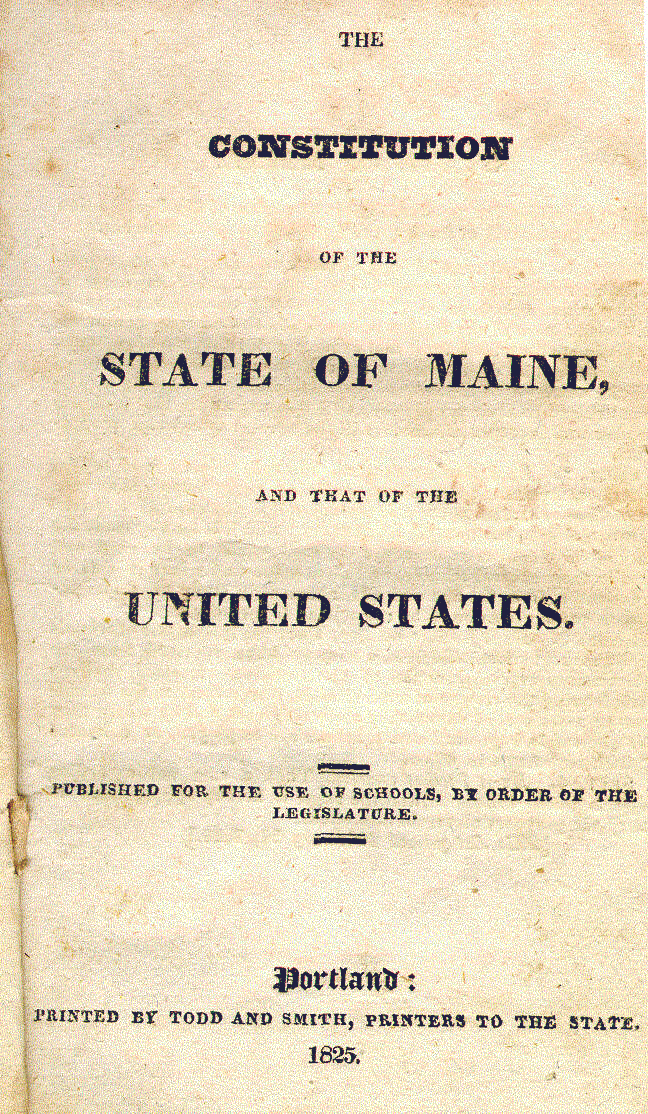 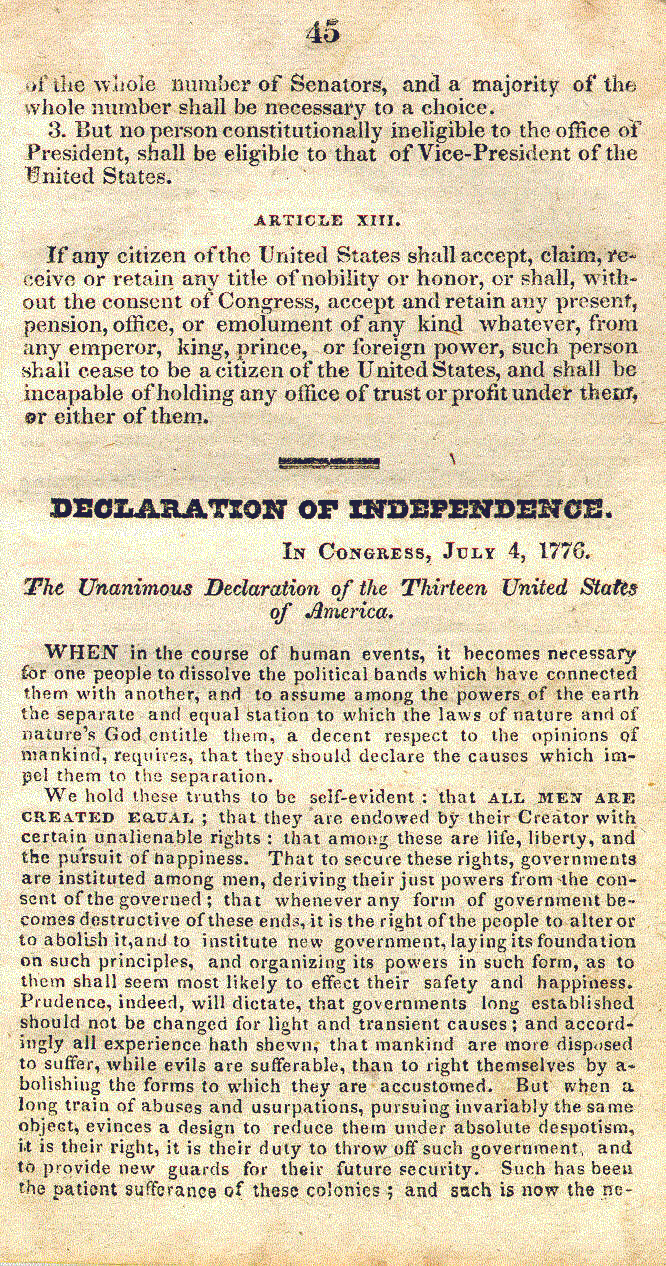 If you want to verify this document, go here: Maine State Archives State Capitol - Station 84 Augusta, ME 04333-0084 (207)287-5295 jeffrey.brown@state.me.us Now the reason lawyer would have been prohibited is because the International Bar Association was charted by the King of England and headquartered in London. So any American lawyer who uses the term Esquire would be in violation of the Constitution, Article 1, Sect. 9. But since there was no penalty for this, it was largely ignored. This would also be pretty defunct today, as most of our lawyers belong to the ABA, or American Bar Association, so only fools who belong to the IBA would fall under this domain. So basically, unless you accept a foreign title, say Knight, you will not be affected and forced to forfeit your citizenship. But back to this lost Amendment, I bet you are asking, was it ever ratified? Well, here is what I found: There were 17 states in 1810, so 13 needed to ratify it: Maryland, Dec. 25, 1810 Kentucky, Jan. 31, 1811 Ohio, Jan. 31, 1811 Delaware, Feb. 2, 1811 Pennsylvania, Feb. 6, 1811 New Jersey, Feb. 13, 1811http://www.dailykos.com/story/2007/7/10/155241/107 Vermont, Oct. 24, 1811 Tennessee, Nov. 21, 1811 Georgia, Dec. 13, 1811 North Carolina, Dec. 23, 1811 Massachusetts, Feb. 27, 1812 New Hampshire, Dec. 10, 1812 This makes 12. Then the War of 1812 broke out, and Washington burned to the ground, and all our documents with it. But we won, of course, and we finally got back on track and according to Congressional Records on December 31, 1817 the House of Representatives resolved that President Monroe find out about the status of the Amendment. In a letter dated February 6, 1818, President Monroe reported to the House that the Secretary of State Adams had written to the governors of Virginia, South Carolina and Connecticut to tell them that the proposed Amendment had been ratified by twelve States and rejected by two (New York and Rhode Island), and asked the governors to notify him of their legislature's position. (House Document No. 76). On February 28, 1818, Secretary of State Adams reported the rejection of the Amendment by South Carolina. [House Doc. No. 129]. So it all comes down to Virginia. There was no West Virginia at this point, keep that in mind. On March 10, the Virginia legislature passed Act No. 280 (Virginia Archives of Richmond, "misc.' file, p. 299 for micro-film): - Quote :
- "Be it enacted by the General Assembly, that there shall be published an edition of the Laws of this Commonwealth in which shall be contained the following matters, that is to say: the Constitution of the United States and the amendments thereto..."
This act was the specific legislated instructions on what was, by law, to be included in the re-publication (a special edition) of the Virginia Civil Code. The Virginia Legislature had already agreed that all Acts were to go into effect on the same day -- the day that the Act to re-publish the Civil Code was enacted. Therefore, the 13th Amendment's official date of ratification would be the date of re-publication of the Virginia Civil Code: March 12, 1819. That makes 13, and is officially in the Constitution. So besides the Maine, and Virginia evidence, who else printed the now missing 13th Amendment?
War Dept. Document from 1825 Reveals Critical Clue to Missing 13th Amendment By The Idaho Observer ( I know, I know, quite a source PT!) http://www.proliberty.com/... - Quote :
- KANSAS CITY -- The Comfort Inn here was the third stop for Freedom Drive, 2002, and the place where Titles of Nobility Amendment (TONA) researcher Suzanne Nevling of San Francisco, California produced a copy of "Military Laws of the United States to which is prefixed the Constitution of the United States."
The book, published under authority of the War Department in 1825, proves that the original 13th Amendment that prohibits Americans from holding Titles of Nobility, was part of the Constitution until it was mysteriously replaced with a new 13th Amendment that banned slavery after the Civil War. "When we found this book last September we knew that we had found that the original 13th Amendment was part of the Constitution as of 1825," Nevling said.
Previous TONA research proves that on March 12, 1819, Virginia became the 13th and final state required for ratification of the original 13th Amendment when it published in the laws of Virginia Act No. 280 as passed by its legislature.
TONA research has shown that the state of Virginia forwarded copies of its revised code to the Department of State, the Congress, the Library of Congress and the President. So, what about hardcopy? Ok.
Here is the Military Laws of the United States, 1825: 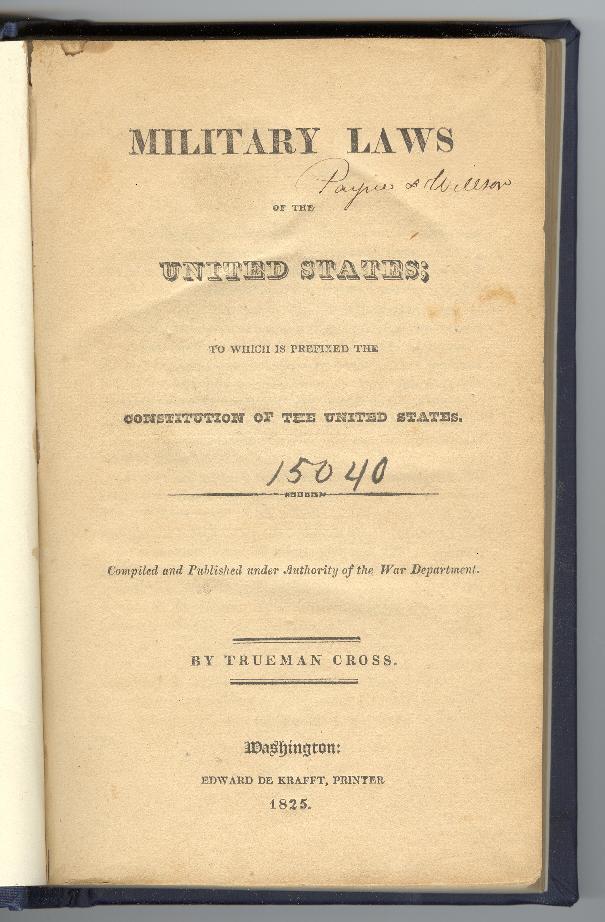 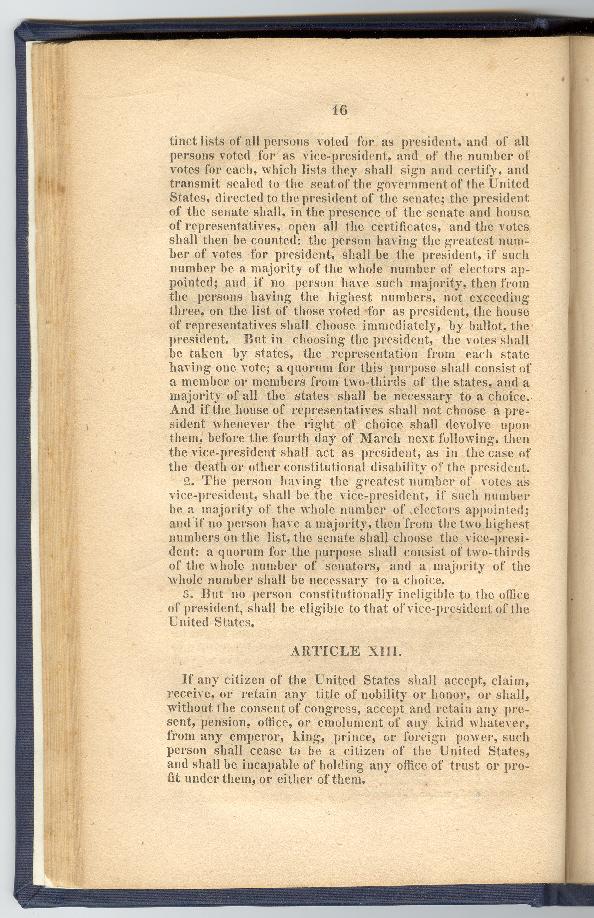
It appears again in 1840, in a Citizen's Handbook: 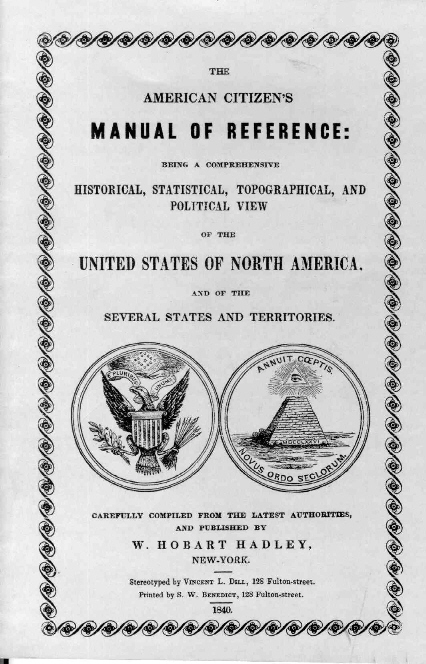 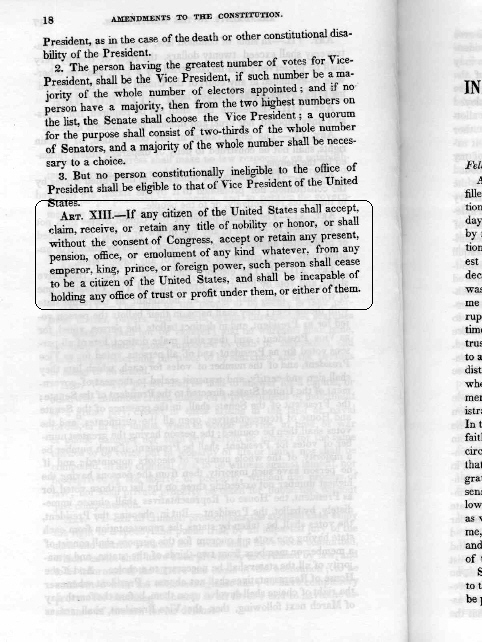
Colorado has it as late as 1867: 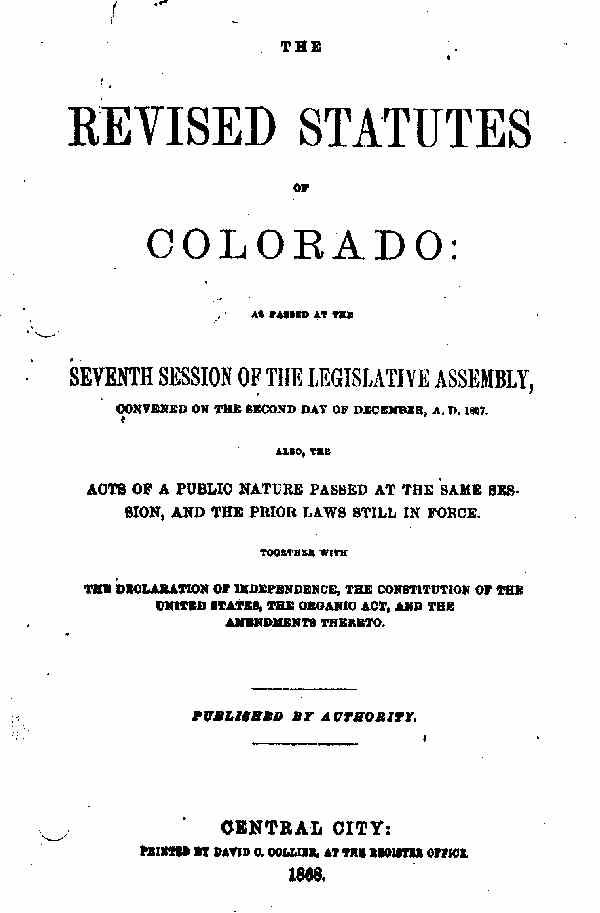 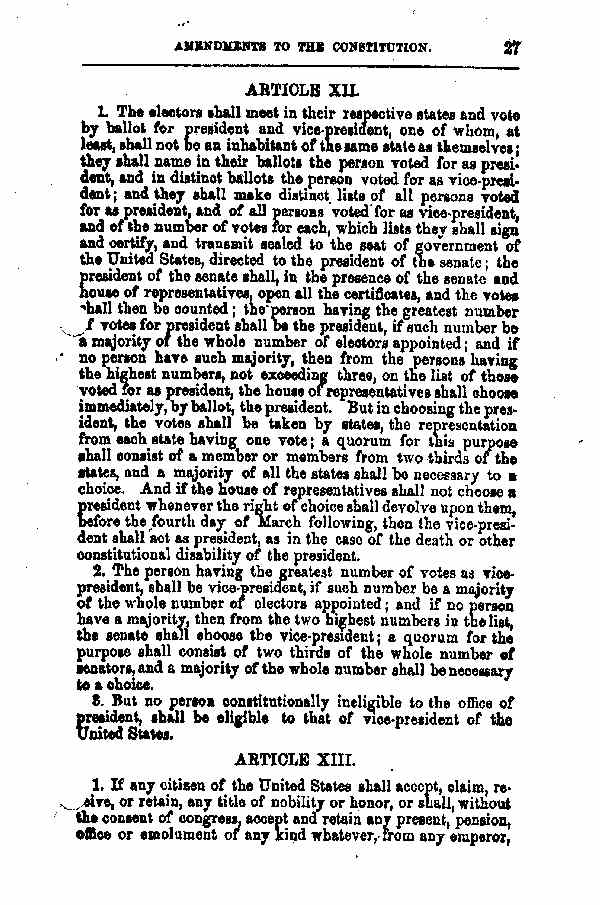 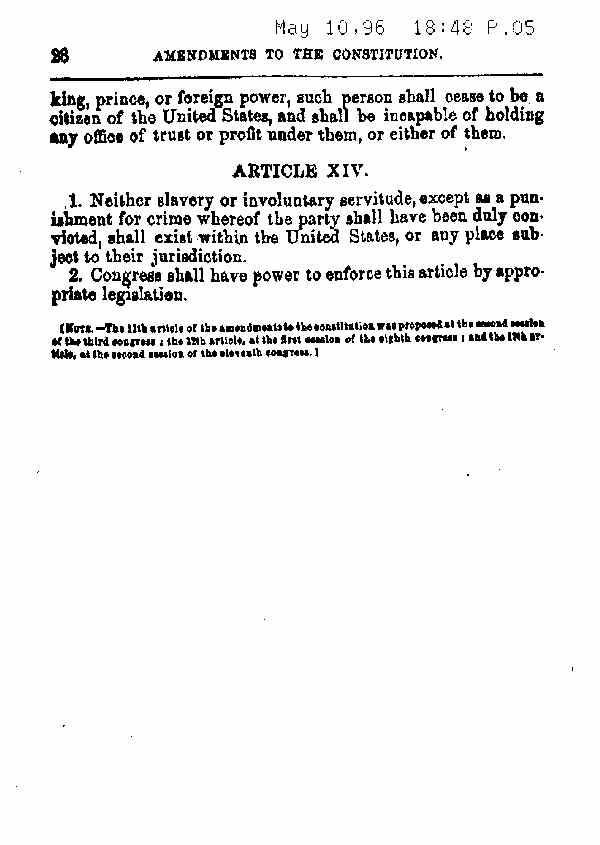
Kansas, 1868, including the "13th" Anti-Slavery Amendment listed at 14: 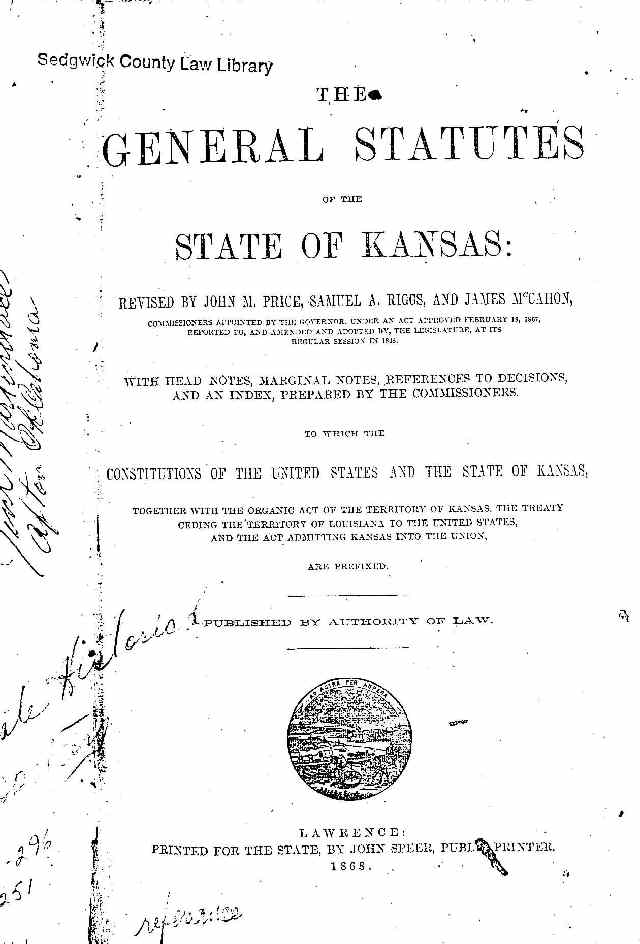 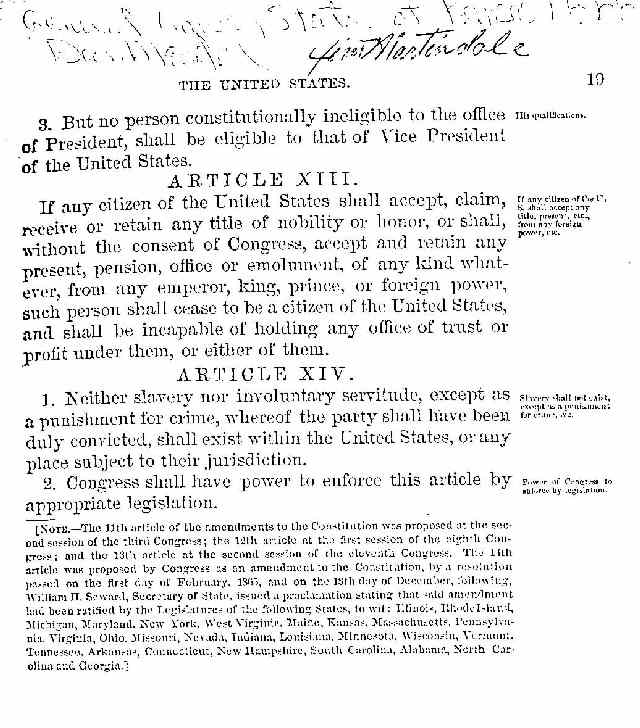
The True Republican, a book published in 1841: 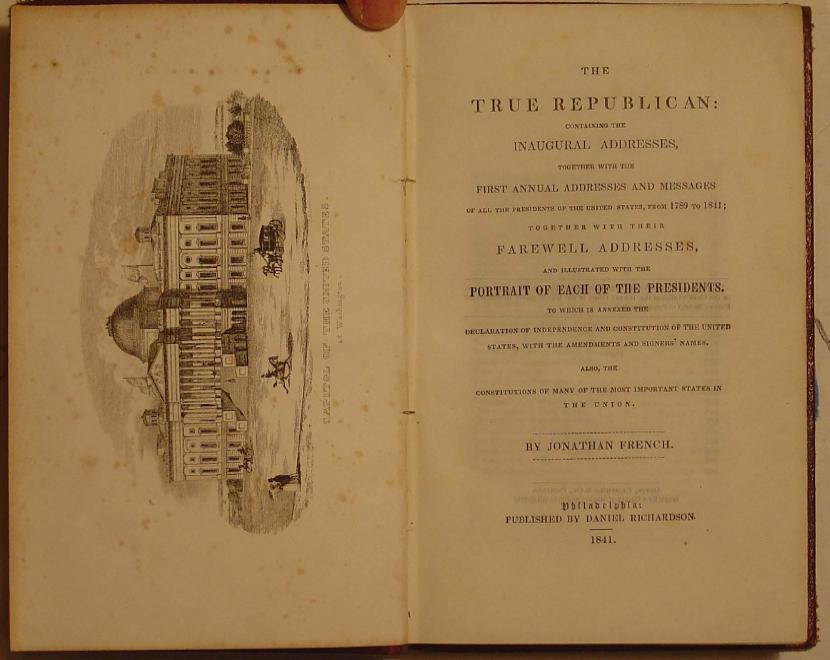 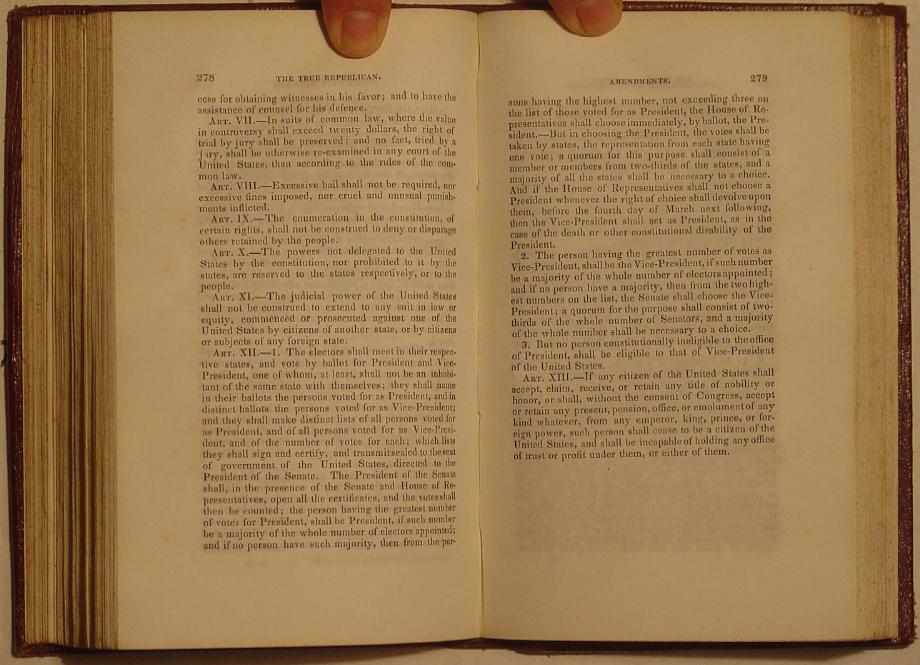
The Constitution - Federalist of 1862: 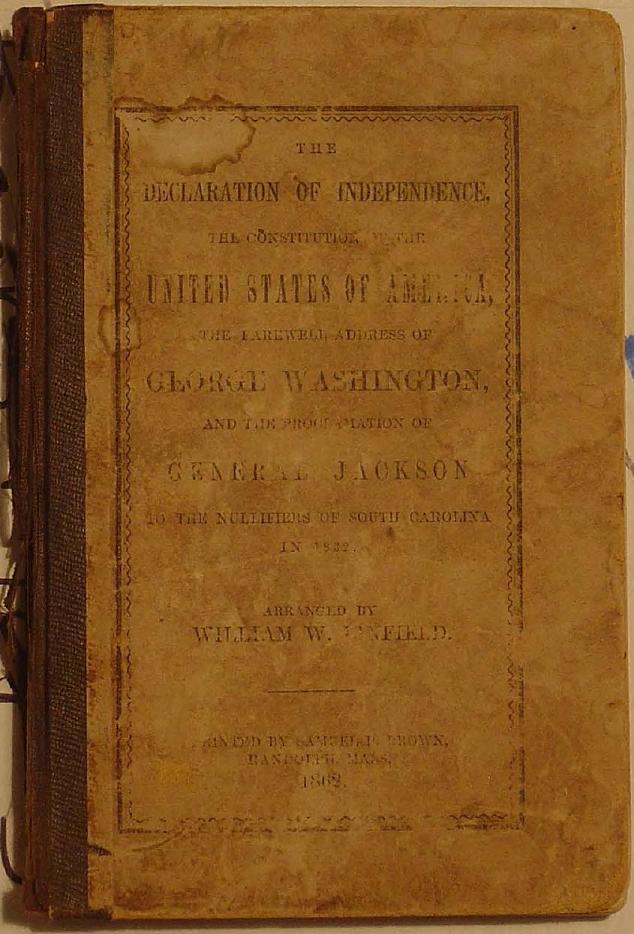 
The Whig Almanac - 1845: 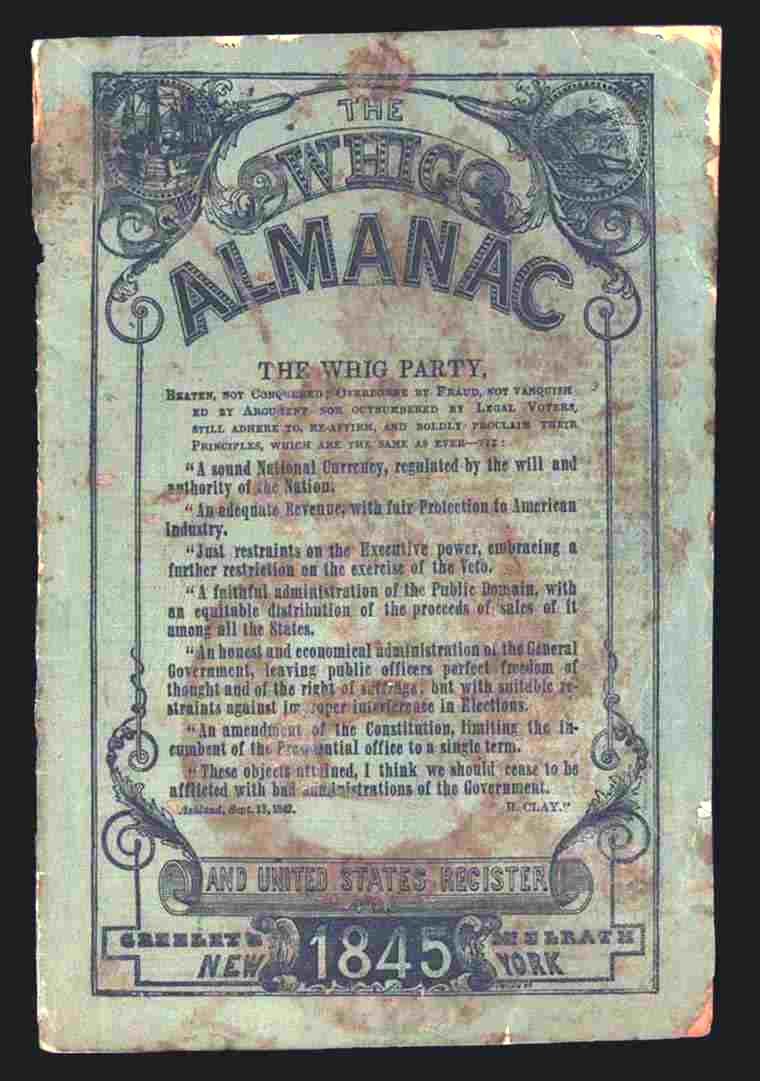 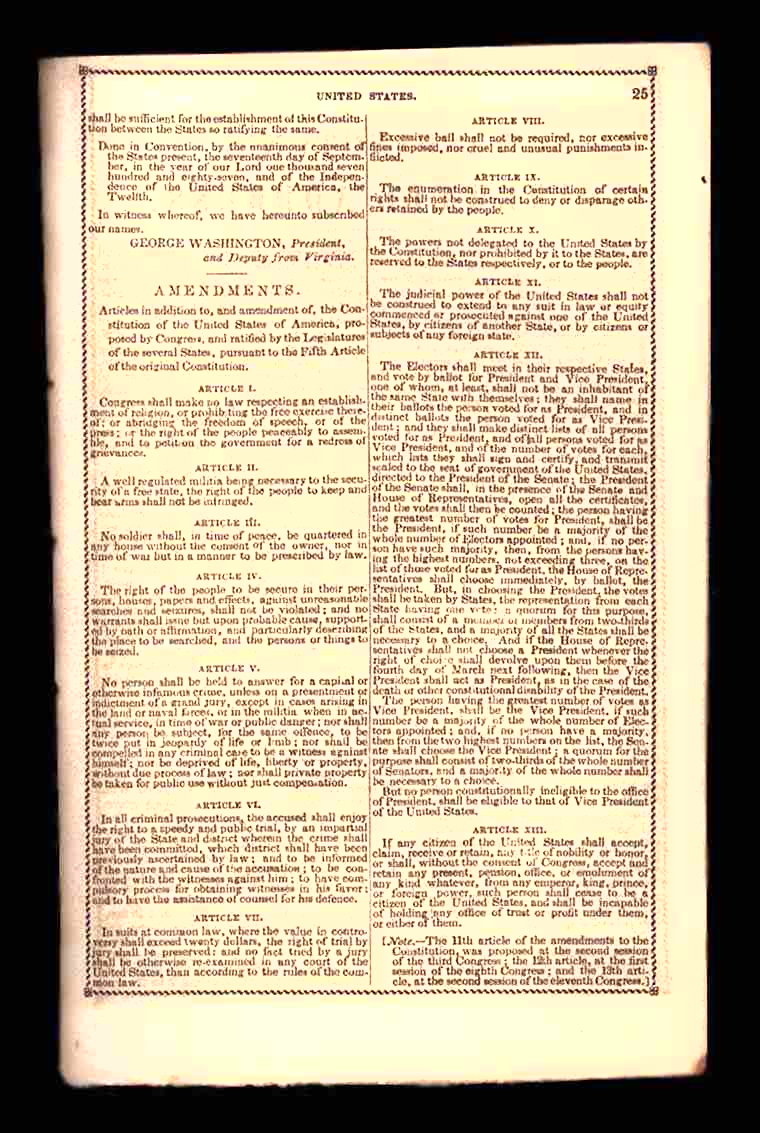 There are many more. Then something happened. Mainly, a Civil War. After the Civil War, this Amendment was basically dropped down the memory hole, finding the 13th Amendment we know, and love, in its place. That was declared ratified on December 18, 1865, which would explain why Colorado and Kansas have our current day 13th Amendment as the 14th Amendment. Very, very odd. So to find a counterpoint, I thought a lawyer site would be the best, and I find a good rebuttal: http://www.thirdamendment.com/... - Quote :
- Even if Virginia ratified the amendment at any time during the ratification process, the amendment did not become part of the Constitution, because the amendment was never just one state away from this threshold. If Virginia ratified in 1819, as extremists claim, the ratification came far too late to matter.
When the amendment was submitted to the states in 1810, 13 ratifications were required; Louisiana was admitted to the Union on April 30, 1812, raising the required number of ratifications to 14. Prior to that date the amendment had received only 11 ratifications
New Hampshire ratified on December 9, 1812, raising the total number of ratifications to 12 out of the needed 14. But Indiana was admitted on December 11, 1816, raising the required number of ratifications to 15. Mississippi's admission on December 10, 1817, did not change the threshold, but Illinois's admission on December 3, 1818 raised the threshold to 16.
The extremist claim that these later states are not relevant, because an amendment only needs the support of three-fourths of the states in existence when it was submitted to the states. History reveals this claim to be specious - and this fact was known at the time the amendment was under consideration. Whenever someone calls someone else an extremist, it's usually because they are right about something that someone fears coming to light. But anyway, he has a valid point about Indiana, Mississippi and Illinois. But that goes back to when Virginia actually ratified it, as opposed to telling everyone they had. Seems odd they would forget that they had updated the Law of the Land, but modes of communication were a lot slower back then. But what seems even odder is all the publications that include this 13th Amendment, all the way up to 1868. To bad everyone involved has been dead and buried for over 150 years now, so we will never know the truth. But if it existed, as much evidence points that it did, then it is still part of the law of the land and valid today. Either way, makes for a hell of a story.
But going back to why they include this, in basically that they felt Article 1, Section 9 might not be tough enough: - Quote :
- No Title of Nobility shall be granted by the United States: And no Person holding any Office of Profit or Trust under them, shall, without the Consent of the Congress, accept of any present, Emolument, Office, or Title, of any kind whatever, from any King, Prince or foreign State.
And to that effect, I give you Knight of the British Empire Rudy Giuliani, obviously a rogue to the intent and language of the Constitution. I expect him to be deported in a fortnight as a rogue for the British Empire for subverting the law of the land in the name of a foreign power, you know, the one we fought our Revolution against.Just thought I'd share.
Last edited by spring2 on Sun Aug 05, 2018 3:58 pm; edited 1 time in total |
|   | | Guest
Guest
 |  Subject: Mississippi Finishes Up the Paperwork on 13th Amendment & Subject: Mississippi Finishes Up the Paperwork on 13th Amendment &  Sun Aug 05, 2018 3:43 pm Sun Aug 05, 2018 3:43 pm | |
| https://loweringthebar.net/2013/02/mississippi-13th-amendment.htmlMississippi Finishes Up the Paperwork on 13th Amendment FEBRUARY 19, 2013A mere 148 years after the end of the Civil War, Mississippi has become the last state to send in its paperwork on the [size=13]13th Amendment, which as you may recall was the one that abolished slavery. FEBRUARY 19, 2013A mere 148 years after the end of the Civil War, Mississippi has become the last state to send in its paperwork on the [size=13]13th Amendment, which as you may recall was the one that abolished slavery.[/size] - Quote :
- [size=13]AMENDMENT XIII
Passed by Congress January 31, 1865. Ratified December 6, 1865.
Section 1.
Neither slavery nor involuntary servitude, except as a punishment for crime whereof the party shall have been duly convicted, shall exist within the United States, or any place subject to their jurisdiction.
Section 1a.
That includes Mississippi.
Section 2.
Congress shall have power to enforce this article by appropriate legislation.[/size] [size] Most of the reports on this event so far have gone with headlines like ABC's "Mississippi Officially Abolishes Slavery, Ratifies 13th Amendment," and I suppose those are better headlines than the one above but they aren't exactly accurate. (I am not above tweaking a headline for humor value, of course, I'm just pointing out a fact.) What happened on February 7, 2013, was a technicality: the Mississippi Secretary of State officially informed the National Archives that his state had indeed ratified the 13th Amendment. For a reason that is still unclear, this notice wasn't given immediately after the state took that action, but everyone who is making fun of Mississippi for not "ratifying" the 13th Amendment until 2013 is being unfair.It did that way back in 1995. It may or may not be accurate to say that Mississippi has just "officially abolished slavery," depending on what is meant by that. Under Article V, amendments to the Constitution are "valid to all Intents and Purposes, as Part of this Constitution, when ratified by the Legislatures of three fourths of the several States" (or by state conventions but that's not how this was done). So slavery was actually abolished on December 6, 1865, when Georgia became the 27th of the (then) 36 states to ratify the 13th Amendment. And at that point the amendment was binding on the other 12, regardless of whether they ratified it or not. Still, it looks like most of the others went ahead and ratified it over the next few years. It probably seemed like the thing to do at the time.Four states actually rejected the amendment outright; in addition to Mississippi, Delaware, Kentucky, and New Jersey also said no (symbolically). New Jersey changed its mind a year later, Delaware in 1901, Kentucky not until 1976, and Mississippi didn't get around to it until 1995. But again, slavery had been illegal in all the states (including later-joining ones) since 1865, so it doesn't seem accurate to say that these states were "abolishing slavery" when they did this. That had already happened whether they liked it or not.As for the claim that ratification wasn't "official" until notice was given, that seems mostly wrong, because as Article V says ("valid … when ratified") and the Supreme Court has held, what matters is the date a state legislature votes to ratify, not the date it gives notice or the federal government "proclaims" ratification or anything like that. So it is more accurate to say Mississippi made its rejection of slavery "official" in 1995, although for strictly legal purposes, that didn't matter either.The oversight regarding notice was cleared up this month after a professor at the University of Mississippi Medical Center took his family to see "Lincoln," which apparently ends by noting that there were a couple of loose ends still to be tied up on this whole slavery thing. He and a colleague then got a copy of the state bill and sent it to the state government, which promptly (this time) contacted the feds. It may or may not be accurate to say that Mississippi has just "officially abolished slavery," depending on what is meant by that. Under Article V, amendments to the Constitution are "valid to all Intents and Purposes, as Part of this Constitution, when ratified by the Legislatures of three fourths of the several States" (or by state conventions but that's not how this was done). So slavery was actually abolished on December 6, 1865, when Georgia became the 27th of the (then) 36 states to ratify the 13th Amendment. And at that point the amendment was binding on the other 12, regardless of whether they ratified it or not. Still, it looks like most of the others went ahead and ratified it over the next few years. It probably seemed like the thing to do at the time.Four states actually rejected the amendment outright; in addition to Mississippi, Delaware, Kentucky, and New Jersey also said no (symbolically). New Jersey changed its mind a year later, Delaware in 1901, Kentucky not until 1976, and Mississippi didn't get around to it until 1995. But again, slavery had been illegal in all the states (including later-joining ones) since 1865, so it doesn't seem accurate to say that these states were "abolishing slavery" when they did this. That had already happened whether they liked it or not.As for the claim that ratification wasn't "official" until notice was given, that seems mostly wrong, because as Article V says ("valid … when ratified") and the Supreme Court has held, what matters is the date a state legislature votes to ratify, not the date it gives notice or the federal government "proclaims" ratification or anything like that. So it is more accurate to say Mississippi made its rejection of slavery "official" in 1995, although for strictly legal purposes, that didn't matter either.The oversight regarding notice was cleared up this month after a professor at the University of Mississippi Medical Center took his family to see "Lincoln," which apparently ends by noting that there were a couple of loose ends still to be tied up on this whole slavery thing. He and a colleague then got a copy of the state bill and sent it to the state government, which promptly (this time) contacted the feds.==========================[/size] https://www.americanbar.org/news/abanews/aba-news-archives/2015/12/legal_experts_discus.html
Legal experts discuss relevance of 13th Amendment 150 years later=====================Missing 13th Amendment Found: “No Lawyers In Public Office”
- Published on September 7, 2016

[size=17]JEAN-MICHEL LETENNIER
[/size] The 13th Amendment to the Constitution of the United States has been altered from its original in order to fool the American public into accepting a government that is mostly illegally in office. The information contained in the article below contains stunning revelations that the entire U.S. congress should be deemed illegitimate, after evidence that a clandestine plot to alter the U.S. Constitution has now emerged.Themillenniumreport.com reports:In the winter of 1983, archival research expert David Dodge, and former Baltimore police investigator Tom Dunn, were searching for evidence of government corruption in public records stored in the Belfast Library on the coast of Maine.By chance, they discovered the library’s oldest authentic copy of the Constitution of the United States (printed in 1825). Both men were stunned to see this document included a 13th Amendment that no longer appears on current copies of the Constitution. Moreover, after studying the Amendment’s language and historical context, they realized the principle intent of this “missing” 13th Amendment was to prohibit lawyers from serving in government. So began a seven year, nationwide search for the truth surrounding the most bizarre Constitutional puzzle in American history — the unlawful removal of a ratified Amendment from the Constitution of the United States.Since 1983, Dodge and Dunn have uncovered additional copies of the Constitution with the “missing” 13th Amendment printed in at least eighteen separate publications by ten different states and territories over four decades from 1822 to 1860. In June of this year (1991), Dodge uncovered the evidence that this missing 13th Amendment had indeed been lawfully ratified by the state of Virginia and was therefore an authentic Amendment to the American Constitution. If the evidence is correct and no logical errors have been made, a 13th Amendment restricting lawyers from serving in government was ratified in 1819 and removed from the U.S. Constitution during the tumult of the Civil War. Since the Amendment was never lawfully repealed, it is still the Law today. The implications are enormous.The story of this “missing” Amendment is complex and at times confusing because the political issues and vocabulary of the American Revolution were different from our own. However, there are essentially two issues: What does the Amendment mean? and, Was the Amendment ratified? Before we consider the issue of ratification, we should first understand the Amendment’s meaning and consequent current relevance.MEANING of the 13th Amendment The “missing” 13th Amendment to the Constitution of the United States reads as follows:“If any citizen of the United States shall accept, claim, receive, or retain any title of nobility or honour, or shall without the consent of Congress, accept and retain any present, pension, office, or emolument of any kind whatever, from any emperor, king, prince, or foreign power, such person shall cease to be a citizen of the United States, and shall be incapable of holding any office of trust or profit under them, or either of them.”At the first reading, the meaning of this 13th Amendment (also called the “title of nobility” Amendment) seems obscure; unimportant. The references to “nobility,” “honour,” “emperor,” “king,” and “prince,” lead us to dismiss this Amendment as a petty post-revolution act of spite directed against the British monarchy. The U.S. modern world of Lady Di and Prince Charles, make anti-royalist sentiments seem so archaic and quaint, that the Amendment can be ignored.Not so. Consider some evidence of its historical significance: First, “titles of nobility” were prohibited in both Article VI of the Articles of Confederation (1777) and in Article I, Sections 9 and 10 of the Constitution of the United States (1787);Second, although already prohibited by the Constitution, an additional “title of nobility” amendment was proposed in 1789, again in 1810, and according to Dodge, finally ratified in 1819. Clearly, the founding fathers saw such a serious threat in “titles of nobility” and “honors” that anyone receiving them would forfeit their citizenship. Since the government prohibited “titles of nobility” several times over four decades, and went through the amending process (even though “titles of nobility” were already prohibited by the Constitution), it’s obvious that the Amendment carried much more significance for our founding fathers than is readily apparent today.HISTORICAL CONTEXTTo understand the meaning of this “missing” 13th Amendment, we must understand its historical context — the era surrounding the American Revolution. We tend to regard the notion of “Democracy” as benign, harmless, and politically unremarkable. But at the time of the American Revolution, King George III and the other monarchies of Europe saw Democracy as an unnatural, ungodly ideological threat, every bit as dangerously radical as Communism was once regarded by modern Western nations. Just as the 1917 Communist Revolution in Russia spawned other revolutions around the world, the American Revolution provided an example and incentive for people all over the world to overthrow their European monarchies.Even though the Treaty of Paris ended the Revolutionary War in 1783, the simple fact of our existence threatened the monarchies. The United States stood as a heroic role model for other nations, that inspired them to also struggle against oppressive monarchies. The French Revolution (1789-1799) and the Polish national uprising (1794) were in part encouraged by the American Revolution. Though we stood like a beacon of hope for most of the world, the monarchies regarded the United States as a political typhoid Mary, the principle source of radical democracy that was destroying monarchies around the world. The monarchies must have realized that if the principle source of that infection could be destroyed, the rest of the world might avoid the contagion and the monarchies would be saved. Their survival at stake, the monarchies sought to destroy or subvert the American system of government. Knowing they couldn’t destroy us militarily, they resorted to more covert methods of political subversion, employing spies and secret agents skilled in bribery and legal deception — it was, perhaps, the first “cold war”. Since governments run on money, politicians run for money, and money is the usual enticement to commit treason, much of the monarchy’s counter- revolutionary efforts emanatedfrom English banks.DON’T BANK ON IT (Modern Banking System)The essence of banking was once explained by Sir Josiah Stamp, a former president of the Bank of England:”The modern banking system manufactures money out of nothing. The process is perhaps the most astounding piece of sleight of hand that was ever invented. Banking was conceived in inequity and born in sin… Bankers own the earth. Take it away from them but leave them the power to create money, and, with a flick of a pen, they will create enough money to buy it back again… Take this great power away from them, or if you want to continue to be the slaves of bankers and pay the cost of your own slavery, then let bankers continue to create money and control credit.”The last great abuse of the U.S. banking system caused the depression of the 1930’s. Today’s abuses may cause another. Current S&L and bank scandals illustrate the on-going relationships between banks, lawyers, politicians, and government agencies (look at the current BCCI bank scandal, involving lawyer Clark Clifford, politician Jimmy Carter, the Federal Reserve, the FDIC, and even the CIA). These scandals are the direct result of years of law-breaking by an alliance of bankers and lawyers using their influence and money to corrupt the political process and rob the public. (Think you’re not being robbed? Guess who’s going to pay the bill for the excesses of the S&L’s, U.S.-taxpayer? You are.) The systematic robbery of productive individuals by parasitic bankers andlawyers is not a recent phenomenon. This abuse is a human tradition that predates the Bible and spread from Europe to America despite early colonial prohibitions.When the first United States Bank was chartered by Congress in 1790, there were only three state banks in existence. At one time, banks were prohibited by law in most states because many of the early settlers were all too familiar with the practices of the European goldsmith banks. Goldsmith banks were safe-houses used to store client’s gold. In exchange for the deposited gold, customers were issued notes (paper money) which were redeemable in gold. The goldsmith bankers quickly succumbed to the temptation to issue “extra” notes, (unbacked by gold). Why? Because the “extra” notes enriched the bankers by allowing them to buy property with notes for gold that they did not own, gold that did not even exist. Colonists knew that bankers occasionally printed too much paper money, found themselves over-leveraged, and caused a “run on the bank”. If the bankers lacked sufficient gold to meet the demand, the paper money became worthless and common citizens left holding the paper were ruined. Although over-leveraged bankers were sometime hung, the bankers continued printing extra money to increase their fortunes at the expense of the productive members of society. (The practice continues to this day, and offers “sweetheart” loans to bank insiders, and even provides the foundation for deficit spending and the U.S. Federal government’s unbridled growth.)PAPER MONEYIf the colonists forgot the lessons of goldsmith bankers, the American Revolution refreshed their memories. To finance the war, Congress authorized the printing of continental bills of credit in an amount not to exceed $200,000,000. The States issued another $200,000,000 in paper notes. Ultimately, the value of the paper money fell so low that they were soon traded on speculation from 5000 to 1000 paper bills for one coin. It’s often suggested that the U.S. Constitution’s prohibition against a paper economy — “No State shall… make any Thing but gold and silver Coin a tender in Payment of Debts” — was a tool of the wealthy to be worked to the disadvantage of all others. But only in a “paper” economy can money reproduce itself and increase the claims of the wealthy at the expense of the productive.“Paper money,” said Pelatiah Webster, “polluted the equity of our laws, turned them into engines of oppression, corrupted the justice of our public administration, destroyed the fortunes of thousands who had confidence in it, enervated the trade, husbandry, and manufactures of U.S. country, and went far to destroy the morality of U.S. people.”CONSPIRACIESA few examples of the attempts by the monarchies and banks that almost succeeded in destroying the United States:According to the Tennessee Laws (1715-1820, vol. II, p. 774), in the 1794 Jay Treaty, the United States agreed to pay 600,000 pounds sterling to King George III, as reparations for the American revolution. The Senate ratified the treaty in secret session and ordered that it not be published. When Benjamin Franklin’s grandson published it anyway, the exposure and resulting public uproar so angered the Congress that it passed the Alien and Sedition Acts (1798) so federal judges could prosecute editors and publishers for reporting the truth about the government. Since we had won the Revolutionary War, why would U.S. Senators agree to pay reparations to the loser? And why would they agree to pay 600,000 pounds sterling, eleven years after the war ended? It doesn’t make sense, especially in light of Senate’s secrecy and later fury over being exposed, unless we assume U.S. Senators had been bribed to serve the British monarchy and betray the American people. That’s subversion.The United States Bank had been opposed by the Jeffersonians from the beginning, but the Federalists (the pro-monarchy party) won out in its establishment. The initial capitalization was $10,000,000 — 80% of which would be owned by foreign bankers. Since the bank was authorized to lend up to $20,000,000 (double its paid in capital), it was a profitable deal for both the government and the bankers since they could lend, and collect interest on, $10,000,000 that didn’t exist.However, the European bankers outfoxed the government and by 1796, the government owed the bank $6,200,000 and was forced to sell its shares. (By 1802, the U.S. government owned no stock in the United States Bank.) The sheer power of the banks and their ability to influence representative government by economic manipulation and outright bribery was exposed in 1811, when the people discovered that European banking interests owned 80% of the bank. Congress therefore refused to renew the bank’s charter. This led to the withdrawal of $7,000,000 in specie by European investors, which in turn, precipitated an economic recession, and the War of 1812. That’s destruction.There are undoubtedly other examples of the monarchy’s efforts to subvert or destroy the United States; some are common knowledge, others remain to be disclosed to the public. For example, David Dodge discovered a book called “2 VA LAW” in the Library of Congress Law Library. According to Dodge, “This is an un-catalogued book in the rare book section that reveals a plan to overthrow the constitutional government by secret agreements engineered by the lawyers. That is one of the reasons why this Amendment was ratified by Virginia and the notification was lost in the mail. There is no public record that this book exists.” That may sound surprising, but according to The Gazette (5/10/91), “the Library of Congress has 349,402 un-catalogued rare books and 13.9 million un-catalogued rare manuscripts.” There may be secrets buried in that mass of documents even more astonishing than a missing Constitutional Amendment.TITLES OF NOBILITYIn seeking to rule the world and destroy the United States, bankers committed many crimes. Foremost among these crimes were fraud, conversion, and plain old theft. To escape prosecution for their crimes, the bankers did the same thing any career criminal does. They hired and formed alliances with the best lawyers and judges money could buy. These alliances, originally forged in Europe (particularly in Great Britain), spread to the colonies, and later into the newly formed United States of America.Despite their criminal foundation, these alliances generated wealth, and ultimately, respectability. Like any modern member of organized crime, English bankers and lawyers wanted to be admired as “legitimate businessmen”. As their criminal fortunes grew so did their usefulness, so the British monarchy legitimized these thieves by granting them “titles of nobility”.Historically, the British peerage system referred to knights as “Squires” and to those who bore the knight’s shields as “Esquires”. As lances, shields, and physical violence gave way to the more civilized means of theft, the pen grew mightier (and more profitable) than the sword, and the clever wielders of those pens (bankers and lawyers) came to hold titles of nobility. The most common title was “Esquire” (used, even today, by some lawyers).INTERNATIONAL BAR ASSOCIATIONIn Colonial America, attorneys trained attorneys but most held no “title of nobility” or “honor”. There was no requirement that one be a lawyer to hold the position of district attorney, attorney general, or judge; a citizen’s “counsel of choice” was not restricted to a lawyer; there were no state or national bar associations. The only organization that certified lawyers was the International Bar Association (IBA), chartered by the King of England, headquartered in London, and closely associated with the international banking system. Lawyers admitted to the IBA received the rank “Esquire” — a “title of nobility”. “Esquire” was the principle title of nobility which the 13th Amendment sought to prohibit from the United States.Why? Because the loyalty of “Esquire” lawyers was suspect. Bankers and lawyers with an “Esquire” behind their names were agents of the monarchy, members of an organization whose principle purposes were political, not economic, and regarded with the same wariness that some people today reserve for members of the KGB or the CIA.Article 1, Sect. 9 of the Constitution sought to prohibit the International Bar Association (or any other agency that granted titles of nobility) from operating in America. But the Constitution neglected to specify a penalty, so the prohibition was ignored, and agents of the monarchy continued to infiltrate and influence the government (as in the Jay Treaty and the US Bank charter incidents). Therefore, a “title of nobility” amendment that specified a penalty (loss of citizenship) was proposed in 1789, and again in 1810. The meaning of the amendment is seen in its intent to prohibit persons having titles of nobility and loyalties to foreign governments and bankers from voting, holding public office, or using their skills to subvert the government.HONORThe missing Amendment is referred to as the “title of nobility” Amendment, but the second prohibition against “honour” (honor), may be more significant.According to David Dodge, Tom Dunn, and Webster’s Dictionary, the archaic definition of “honor” (as used when the 13th Amendment was ratified) meant anyone “obtaining or having an advantage or privilege over another”. A contemporary example of an “honor” granted to only a few Americans is the privilege of being a judge: Lawyers can be judges and exercise the attendant privileges and powers; non-lawyers cannot.By prohibiting “honors”, the missing Amendment prohibits any advantage or privilege that would grant some citizens an unequal opportunity to achieve or exercise political power. Therefore, the second meaning (intent) of the 13th Amendment was to ensure political equality among all American citizens, by prohibiting anyone, even government officials, from claiming or exercising a special privilege or power (an “honor”) over other citizens.If this interpretation is correct, “honor” would be the key concept in the 13th Amendment. Why? Because, while “titles of nobility” may no longer apply in today’s political system, the concept of “honor” remains relevant. For example, anyone who had a specific “immunity” from lawsuits which were not afforded to all citizens, would be enjoying a separate privilege, an “honor”, and would therefore forfeit his right to vote or hold public office. Think of the “immunities” from lawsuits that U.S. judges, lawyers, politicians, and bureaucrats currently enjoy. As another example, think of all the “special interest” legislation the U.S. government passes: “special interests” are simply euphemisms for “special privileges” (honors).WHAT IF? (Implications if Restored)If the missing 13th Amendment were restored, “special interests” and “immunities” might be rendered unconstitutional. The prohibition against “honors” (privileges) would compel the entire government to operate under the same laws as the citizens of this nation. Without their current personal immunities (honors), US judges and I.R.S. agents would be unable to abuse common citizens without fear of legal liability. If this 13th Amendment were restored, the entire U.S. Government would have to conduct itself according to the same standards of decency, respect, law, and liability as the rest of the nation. If this Amendment and the term “honor” were applied today, U.S. Government’s ability to systematically coerce and abuse the public would be all but eliminated.Imagine! A government without special privileges or immunities. How could we describe it? It would be … almost like … a government … of the people … by the people … for the people! Imagine: a government … whose members were truly accountable to the public; a government that could not systematically exploit its own people! It’s unheard of … it’s never been done before. Not ever in the entire history of the world.Bear in mind that Senator George Mitchell of Maine and the U.S. National Archives concede this 13th Amendment was proposed by Congress in 1810. However, they explain that there were seventeen states when Congress proposed the “title of nobility” Amendment; that ratification required the thirteen states, but since only twelve states supported the Amendment, it was not ratified. The Government Printing Office agrees; it currently prints copies of the Constitution of the United States which include the “title of nobility” Amendment as proposed, but un-ratified.Even if this 13th Amendment were never ratified, even if Dodge and Dunn’s research or reasoning is flawed or incomplete, it would still be an extraordinary story. Can you imagine, can you understand how close the US came to having a political paradise, right here on Earth? Do you realize what an extraordinary gift our forebears tried to bequeath us? And how close we came? One vote. One state’s vote.The federal government concedes that twelve states voted to ratify this Amendment between 1810 and 1812. But they argue that ratification require thirteen states, so the Amendment lays stillborn in history, unratified for lack of a just one more state’s support. One vote. David Dodge, however, says one more state did ratify, and he claims he has the evidence to prove it.PARADISE LOST, RATIFICATION FOUNDIn 1789, the House of Representatives compiled a list of possible Constitutional Amendments, some of which would ultimately become our Bill of Rights. The House proposed seventeen; the Senate reduced the list to twelve. During this process that Senator Tristrain Dalton (Mass.) proposed an Amendment seeking to prohibit and provide a penalty for any American accepting a “title of Nobility” (RG 46 Records of the U.S. Senate). Although it wasn’t passed, this was the first time a “title of nobility” amendment was proposed.Twenty years later, in January, 1810, Senator Reed proposed another “Title of Nobility” Amendment (History of Congress, Proceedings of the Senate, p. 529-530). On April 27, 1810, the Senate voted to pass this 13th Amendment by a vote of 26 to 1; the House resolved in the affirmative 87 to 3; and the following resolve was sent to the States for ratification:“If any citizen of the United States shall Accept, claim, receive or retain any title of nobility or honour, or shall, without the consent of Congress, accept and retain any present, pension, office or emolument of any kind whatever, from any emperor, king, prince or foreign power, such person shall cease to be a citizen of the United States, and shall be incapable of holding any office of trust or profit under them, or either of them.”The Constitution requires three-quarters of the states to ratify a proposed amendment before it may be added to the Constitution. When Congress proposed the “Title of Nobility” Amendment in 1810, there were states, thirteen of which would have to ratify for the Amendment to be adopted. According to the National Archives, the following is a list of the twelve states that ratified, and their dates of ratification:Maryland, Dec. 25, 1810Kentucky, Jan. 31, 1811Ohio, Jan. 31, 1811Delaware, Feb. 2, 1811Pennsylvania, Feb. 6, 1811New Jersey, Feb. 13, 1811Vermont, Oct. 24, 1811Tennessee, Nov. 21, 1811Georgia, Dec. 13, 1811North Carolina, Dec. 23, 1811Massachusetts, Feb. 27, 1812New Hampshire, Dec. 10, 1812Before a thirteenth state could ratify, the War of 1812 broke out with England. By the time the war ended in 1814, the British had burned the Capitol, the Library of Congress, and most of the records of the first 38 years of government. Whether there was a connection between the proposed “title of nobility” amendment and the War of 1812 is not known. However, the momentum to ratify the proposed Amendment was lost in the tumult of war.Then, four years later, on December 31, 1817, the House of Representatives resolved that President Monroe inquire into the status of this Amendment. In a letter dated February 6, 1818, President Monroe reported to the House that the Secretary of State Adams had written to the governors of Virginia, South Carolina and Connecticut to tell them that the proposed Amendment had been ratified by twelve States and rejected by two (New York and Rhode Island), and asked the governors to notify him of their legislature’s position. (House Document No. 76) (This, and other letters written by the President and the Secretary of State during the month of February, 1818, note only that the proposed Amendment had not yet been ratified. However, these letters would later become crucial because, in the absence of additional information they would be interpreted to mean the amendment was never ratified).On February 28, 1818, Secretary of State Adams reported the rejection of the Amendment by South Carolina. [House Doc. No. 129]. There are no further entries regarding the ratification of the 13th Amendment in the Journals of Congress; whether Virginia ratified is neither confirmed nor denied. Likewise, a search through the executive papers of Governor Preston of Virginia does not reveal any correspondence from Secretary of State Adams. (However, there is a journal entry in the Virginia House that the Governor presented the House with an official letter and documents from Washington within a time frame that conceivably includes receipt of Adams’ letter.) Again, no evidence of ratification; none of denial.However, on March 10, 1819, the Virginia legislature passed Act No. 280 (Virginia Archives of Richmond, “misc.’ file, p. 299 for micro-film): “Be it enacted by the General Assembly, that there shall be published an edition of the Laws of this Commonwealth in which shall be contained the following matters, that is to say: the Constitution of the united States and the amendments thereto…” This act was the specific legislated instructions on what was, by law, to be included in the re-publication (a special edition) of the Virginia Civil Code. The Virginia Legislature had already agreed that all Acts were to go into effect on the same day — the day that the Act to re-publish the Civil Code was enacted. Therefore, the 13th Amendment’s official date of ratification would be the date of re-publication of the Virginia Civil Code: March 12, 1819.The Delegates knew Virginia was the last of the 13 States that were necessary for the ratification of the 13th Amendment. They also knew there were powerful forces allied against this ratification so they took extraordinary measures to make sure that it was published in sufficient quantity (4,000 copies were ordered, almost triple their usual order), and instructed the printer to send a copy to President James Monroe as well as James Madison and Thomas Jefferson. (The printer, Thomas Ritchie, was bonded. He was required to be extremely accurate in his research and his printing, or he would forfeit his bond.)In this fashion, Virginia announced the ratification: by publication and dissemination of the Thirteenth Amendment of the Constitution.There is question as to whether Virginia ever formally notified the Secretary of State that they had ratified this 13th Amendment. Some have argued that because such notification was not received (or at least, not recorded), the Amendment was therefore not legally ratified. However, printing by a legislature is prima facie evidence of ratification. Further, there is no Constitutional requirement that the Secretary of State, or anyone else, be officially notified to complete the ratification process. The Constitution only requires that three- fourths of the states ratify for an Amendment to be added to the Constitution. If three-quarters of the states ratify, the Amendment is passed. Period. The Constitution is otherwise silent on what procedure should be used to announce, confirm, or communicate the ratification of amendments.Knowing they were the last state necessary to ratify the Amendment, the Virginians had every right announce their own and the nation’s ratification of the Amendment by publishing it on a special edition of the Constitution, and so they did.Word of Virginia’s 1819 ratification spread throughout the States and both Rhode Island and Kentucky published the new Amendment in 1822. Ohio first published in 1824. Maine ordered 10,000 copies of the Constitution with the 13th Amendment to be printed for use in the schools in 1825, and again in 1831 for their Census Edition. Indiana Revised Laws of 1831 published the 13th Article on p. 20. Northwestern Territories published in 1833. Ohio published in 1831 and 1833. Then came the Wisconsin Territory in 1839; Iowa Territory in 1843; Ohio again, in 1848; Kansas Statutes in 1855; and Nebraska Territory six times in a row from 1855 to 1860. So far, David Dodge has identified eleven different states or territories that printed the Amendment in twenty separate publications over forty-one years. And more editions including this 13th Amendment are sure to be discovered. Clearly, Dodge is onto something.You might be able to convince some of the people, or maybe even all of them, for a little while, that this 13th Amendment was never ratified. Maybe you can show them that the ten legislatures which ordered it published eighteen times we’ve discovered (so far) consisted of ignorant politicians who don’t know their amendments from their… ahh, articles. You might even be able to convince the public that our U.S. forefathers never meant to “outlaw” public servants who pushed people around, accepted bribes or special favors to “look the other way.” Maybe. But before you do, there’s an awful lot of evidence to be explained.THE AMENDMENT DISAPPEARSIn 1829, the following note appears on p. 23, Vol. 1 of the New York Revised Statutes:“In the edition of the Laws of the U.S. before referred to, there is an amendment printed as article 13, prohibiting citizens from accepting titles of nobility or honor, or presents, offices, &c. from foreign nations. But, by a message of the president of the United States of the 4th of February, 1818, in answer to a resolution of the house of representatives, it appears that this amendment had been ratified only by 12 states, and therefore had not been adopted. See Vol. IV of the printed papers of the 1st session of the 15th congress, No. 76.” In 1854, a similar note appeared in the Oregon Statutes. Both notes refer to the Laws of the United States, 1st vol. p. 73 (or 74).It’s not yet clear whether the 13th Amendment was published in Laws of the United States, 1st Vol., prematurely, by accident, in anticipation of Virginia’s ratification, or as part of a plot to discredit the Amendment by making it appear that only twelve States had ratified. Whether the Laws of the United States Vol. 1 (carrying the 13th Amendment) was re-called or made-up is unknown. In fact, it’s not even clear that the specified volume was actually printed — the Law Library of the Library of Congress has no record of its existence.However, because the noted authors reported no further references to the 13th Amendment after the Presidential letter of February, 1818, they apparently assumed the ratification process had ended in failure at that time. If so, they neglected to seek information on the Amendment after 1818, or at the state level, and therefore missed the evidence of Virginia’s ratification. This opinion — assuming that the Presidential letter of February, 1818, was the last word on the Amendment — has persisted to this day.In 1849, Virginia decided to revise the 1819 Civil Code of Virginia (which had contained the 13th Amendment for 30 years). It was at that time that one of the code’s revisers (a lawyer named Patton) wrote to the Secretary of the Navy, William B. Preston, asking if this Amendment had been ratified or appeared by mistake. Preston wrote to J. M. Clayton, the Secretary of State, who replied that this Amendment was not ratified by a sufficient number of States. This conclusion was based upon the information that Secretary of State John Quincy Adams had provided the House of Representatives in 1818, before Virginia’s ratification in 1819. (Even today, the Congressional Research Service tells anyone asking about this 13th Amendment this same story: that only twelve states, not the requisite thirteen, had ratified.)However, despite Clayton’s opinion, the Amendment continued to be published in various states and territories for at least another eleven years (the last known publication was in the Nebraska territory in 1860). Once again the 13th Amendment was caught in the riptides of American politics. South Carolina seceded from the Union in December of 1860, signaling the onset of the Civil War. In March, 1861, President Abraham Lincoln was inaugurated.Later in 1861, another proposed amendment, also numbered thirteen, was signed by President Lincoln. This was the only proposed amendment that was ever signed by a president. That resolve to amend read:“ARTICLE THIRTEEN, No amendment shall be made to the Constitution which will authorize or give to Congress the power to abolish or interfere, within any State, with the domestic institutions thereof, including that of persons held to labor or service by the laws of said State.”In other words, President Lincoln had signed a resolve that would have permitted slavery, and upheld states’ rights. Only one State, Illinois, ratified this proposed amendment before the Civil War broke out in 1861. In the tumult of 1865, the original 13th Amendment was finally removed from the US Constitution. On January 31, another 13th Amendment (which prohibited slavery in Sect. 1, and ended states’ rights in Sect. 2) was proposed. On April 9, the Civil War ended with General Lee’s surrender. On April 14, President Lincoln (who, in 1861, had signed the proposed Amendment that would have allowed slavery and states rights) was assassinated. On December 6, the “new” 13th Amendment loudly prohibiting slavery (and quietly surrendering states rights to the federal government) was ratified, replacing and effectively erasing the original 13th Amendment that had prohibited “titles of nobility” and “honors”.SIGNIFICANCE OF REMOVALTo create the present oligarchy (rule by lawyers) which the U.S. now endures, the lawyers first had to remove the 13th “titles of nobility” Amendment that might otherwise have kept them in check. In fact, it was not until after the Civil War and after the disappearance of this 13th Amendment, that American bar associations began to appear and exercise political power.Since the unlawful deletion of the 13th Amendment, the newly developing bar associations began working diligently to create a system wherein lawyers took on a title of privilege and nobility as “Esquires” and received the “honor” of offices and positions (like district attorney or judge) that only they could hold. By virtue of these titles, honors, and special privileges, lawyers have assumed political and economic advantages over the majority of U.S. citizens. Through these privileges, they have nearly established a two-tiered citizenship in this nation where a majority may vote, but only a minority (lawyers) may run for political office. This two-tiered citizenship is clearly contrary to Americans’ political interests, the nation’s economic welfare, and the Constitution’s egalitarian spirit.The significance of this missing 13th Amendment and its deletion from the Constitution is this: Since the amendment was never lawfully nullified, it is still in full force and effect and is the Law of the land. If public support could be awakened, this missing Amendment might provide a legal basis to challenge many existing laws and court decisions previously made by lawyers who were unconstitutionally elected or appointed to their positions of power; it might even mean the removal of lawyers from the current US government system.At the very least, this missing 13th Amendment demonstrates that two centuries ago, lawyers were recognized as enemies of the people and nation. Some things never change.THOSE WHO CANNOT RECALL HISTORY …. Heed warnings of Founding FathersIn his farewell address, George Washington warned of “… change by usurpation; for through this, in one instance, may be the instrument of good, it is the customary weapon by which free governments are destroyed.” In 1788, Thomas Jefferson proposed that we have a Declaration of Rights similar to Virginia’s. Three of his suggestions were “freedom of commerce against monopolies, trial by jury in all cases” and “no suspensions of the habeas corpus.”No doubt Washington’s warning and Jefferson’s ideas were dismissed as redundant by those who knew the law. Who would have dreamed the U.S. legal system would become a monopoly against freedom when that was one of the primary causes for the rebellion against King George III?Yet, the denial of trial by jury is now commonplace in the U.S. courts, and habeas corpus, for crimes against the state, is suspended. (By crimes against the state, I refer to “political crimes” where there is no injured party and the corpus delicti [evidence] is equally imaginary.)The authority to create monopolies was judge-made law by Supreme Court Justice John Marshall, et al during the early 1800’s. Judges (and lawyers) granted to themselves the power to declare the acts of the People “un-Constitutional”, waited until their decision was grandfathered, and then granted themselves a monopoly by creating the bar associations. Although Article VI of the U.S. Constitution mandates that executive orders and treaties are binding upon the states (“… and the Judges in every State shall be bound thereby, any Thing in the Constitution or Laws of any State to the Contrary notwithstanding.”), the supreme Court has held that the Bill of Rights is not binding upon the states, and thereby resurrected many of the complaints enumerated in the Declaration of Independence, exactly as Thomas Jefferson foresaw in “Notes on the State of Virginia”, Query 17, p. 161, 1784:“Our rulers will become corrupt, our people careless… the time for fixing every essential right on a legal basis is [now] while our rulers are honest, and ourselves united. From the conclusion of this war we shall be going downhill. It will not then be necessary to resort every moment to the people for support. They will be forgotten, therefore, and their rights disregarded. They will forget themselves, but in the sole faculty of making money, and will never think of uniting to effect a due respect for their rights. The shackles, therefore, which shall not be knocked off at the conclusion of this war, will remain on us long, will be made heavier and heavier, till our rights shall revive or expire in a convulsion.”We await the inevitable convulsion. Only two questions remain: Will we fight to revive our rights? Or, Will we meekly submit as our last remaining rights expire, surrendered to the courts, and perhaps to a “new world order”? |
|   | | Guest
Guest
 |  Subject: CA Bullet-Microstamping Law Upheld By 9th Circuit, Even Though Technology Doesn't Exist Subject: CA Bullet-Microstamping Law Upheld By 9th Circuit, Even Though Technology Doesn't Exist  Sun Aug 05, 2018 4:44 pm Sun Aug 05, 2018 4:44 pm | |
| #2 CA Bullet-Microstamping Law Upheld By 9th Circuit, Even Though Technology Doesn't Exist by Tyler Durden by Tyler Durden
Sun, 08/05/2018 - 13:30
Print
A California "microstamping" law that requires new semi-automatic handguns automatically imprint bullet casings with identifying information has been upheld by the 9th circuit court of appeals in a 2:1 split decision - despite the fact that the technology doesn't exist, reports ABC News.The microstamping law - the first of its kind in the nation signed in 2007 by then-governor Arnold Schwarzenegger, took effect in 2013. It requires that brand new handguns sold in California imprint the gun's make, model and serial number in "two or more places" on each bullet casing from a spent round. [url=https://www.zerohedge.com/sites/default/files/inline-images/struck primer.jpg?itok=JJOD2oN4] [/url]The result of the new law was Smith & Wesson, Ruger and other manufacturers opting to pull out of California.Gun rights advocates have slammed the law, as the technology doesn't exist to stamp bullet casings in two places as the law is written, and even if it did, criminals could replace or file down the firing pin and any other mechanism to "microstamp." [/url]The result of the new law was Smith & Wesson, Ruger and other manufacturers opting to pull out of California.Gun rights advocates have slammed the law, as the technology doesn't exist to stamp bullet casings in two places as the law is written, and even if it did, criminals could replace or file down the firing pin and any other mechanism to "microstamp." - Quote :
- The law became effective as soon as the California Department of Justice certified that the technology used to create the imprint was available. When this certification occurred in 2013, the State clarified that the certification confirmed only “the lack of any patent restrictions on the imprinting technology, not the availability of the technology itself.” In layman’s terms, the state was saying that nothing was stopping someone from developing the technology, so it was “available,” even though it wasn’t. -NRA-ILA
As a result, compliance with the law's "dual placement microstamping" requirement was both practically and legally "impossible," according to court documents from a lawsuit brought by the National Shooting Sports Foundation (NSSF) and the Sporting Arms and Ammunition Manufacturers Institute (SAAMI). In support of their claim, writes the NRA Institute for Legislative Action, the plaintiffs cited an existing provision of California law, Civil Code section 3531, which states “[t]he law never requires impossibilities.” California gun rights advocates say the law effectively bans the sale of new semi-automatic handguns in the state. And what did the 9th circuit say to that? Too bad - as residents can still buy used handguns that don't carry the yet-to-be invented microstamping technology, as well as any guns on a pre-approved roster - thus, the inability to buy a new semiautomatic handgun that's not on the roster doesn't infringe on the 2nd Amendment right to self-defense. - Quote :
- Writing for the majority, Judge M. Margaret McKeown said the inability to buy particular guns did not infringe the 2nd Amendment right to self-defense in the home.
"Indeed, all of the plaintiffs admit that they are able to buy an operable handgun suitable for self-defense — just not the exact gun they want," she said.
McKeown, joined by Judge J. Clifford Wallace, also rejected the argument that the stamping technology was impossible to implement. -ABC News - Quote :

Juliet Williams
✔@JWilliamsAP
[ltr]SAN FRANCISCO (AP) — In ruling on bullet-stamping law, California Supreme Court says state laws cannot be invalidated on the grounds that complying with them is impossible.[/ltr]
10:49 AM - Jun 28, 2018
[ltr]
Twitter Ads info and privacy
[/ltr]  Calguns foundation executive director Brandon Combs said that the 9th circuit used a less rigorous judicial standard in order to arrive at its "policy preferences." "Really what the 9th Circuit is saying and has said in other cases basically is as long as a person that is law abiding has access to one handgun inside of their home, then that's it," he said. "That's the extent of their right. We think that's quite wrong." Calguns foundation executive director Brandon Combs said that the 9th circuit used a less rigorous judicial standard in order to arrive at its "policy preferences." "Really what the 9th Circuit is saying and has said in other cases basically is as long as a person that is law abiding has access to one handgun inside of their home, then that's it," he said. "That's the extent of their right. We think that's quite wrong." Dissenting from the majority was Judge Jay Bybee, who cited conflicting evidence over whether the microstamping technology was even technologically feasible - and that if the state adopted an impossible requirement that no gun manufacturer can satisfy, it would not help the state solve handgun crimes and would illegally restrict gun purchases. As Breitbart's resident Second Amendment columnist AWR Hawkins detailed in 2015, Maryland canceled a similar "ballistic fingerprinting" program after 15 years and $5 million dumped into the program resulted in no crimes solved. The law did not call for "microstamping" like California's - rather it relied on unique metallurgical "fingerprints" left behind by a gun's firing pin. Each new gun sold in the state would need to be fired one time, and the resulting bullet casing sent to the state's police headquarters. Unfortunately, while the forensic technology to match a bullet casing with a gun exists - the computerized system designed to sort and matched images of casings never worked - so the state canceled the program. Of course, just wait until DNA identification is implemented:https://youtu.be/9YO8_lLLcJM Dissenting from the majority was Judge Jay Bybee, who cited conflicting evidence over whether the microstamping technology was even technologically feasible - and that if the state adopted an impossible requirement that no gun manufacturer can satisfy, it would not help the state solve handgun crimes and would illegally restrict gun purchases. As Breitbart's resident Second Amendment columnist AWR Hawkins detailed in 2015, Maryland canceled a similar "ballistic fingerprinting" program after 15 years and $5 million dumped into the program resulted in no crimes solved. The law did not call for "microstamping" like California's - rather it relied on unique metallurgical "fingerprints" left behind by a gun's firing pin. Each new gun sold in the state would need to be fired one time, and the resulting bullet casing sent to the state's police headquarters. Unfortunately, while the forensic technology to match a bullet casing with a gun exists - the computerized system designed to sort and matched images of casings never worked - so the state canceled the program. Of course, just wait until DNA identification is implemented:https://youtu.be/9YO8_lLLcJM |
|   | | Sponsored content
 |  Subject: Re: SPRING'S 5 AUG = The Missing 13th Amendment, Subject: Re: SPRING'S 5 AUG = The Missing 13th Amendment,  | |
| |
|   | | | | SPRING'S 5 AUG = The Missing 13th Amendment, |  |
|
Similar topics |  |
|
| | Permissions in this forum: | You cannot reply to topics in this forum
| |
| |
| |
|





